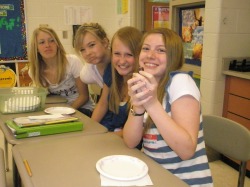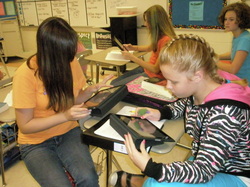Research

MYTHOLOGY -- BASEBALL CARD & CHILDREN'S BOOK
During this unit of study, students select a Greek character to research (I limit my students to gods, goddesses, monsters and other creatures). While researching, they learn all kinds of facts that can fit on a baseball card. They keep track of their sources and make an MLA works cited page to hand in with one baseball card. Once they have designed one card, we mass produce them with 8 on a cardstock page. The students cut and trade them with their classmates so that they have a complete set of Greek monsters, creatures, gods and goddesses. To help them to get to know the different characters, we play name-that-Greek bingo when we have 5 minutes here and there throughout our study of mythology. They write the names of the characters into their bingo board and I use the descriptions to call characters.
In addition, when we are ready to write our own children's myth, students select a topic that will help explain a natural phenomenon. After they have written the myth, they research for a day and add a page in their book that explains the science behind the real explanation for that phenomenon. This gives one more opportunity to practice in-text citation, note taking, and creating a works cited page. This writing gives them the chance to use the research from the baseball card assignment, as they are required to use the Greek characters in their myth.

| baseball_card_assignment.pdf |
| File Size: | 69 kb |
| File Type: | pdf |
Download File

| baseball_card_prewriting.pdf |
| File Size: | 81 kb |
| File Type: | pdf |
Download File

| mythology_intro_and_ideas.pdf |
| File Size: | 66 kb |
| File Type: | pdf |
Download File

| mythology_brainstorm_chart.pdf |
| File Size: | 58 kb |
| File Type: | pdf |
Download File

| mythology_jobsheet.pdf |
| File Size: | 62 kb |
| File Type: | pdf |
Download File
NARRATIVE RESEARCH ESSAY
The research project that we have used with students in grades 7, 10 and 12 involves a bit of change in perspective. While students still learn the skills of finding appropriate sources, taking notes, organizing information and writing fluidly with facts, they write from a narrative perspective within the "story" of their research. This adjustment allows students to own the information, prevents students from plagiarizing the information, and encourages a deeper creativity of thought than a traditional research paper. It also makes for much more interesting reading while assessing. Students are excited about the writing they do and can't wait to share it with their peers.
In addition, a part of the project is a formal, interactive presentation to the class, in which students compose a very traditional argument that is supported with research facts. We have found this to be a much better approach to teaching research, and one that students easily generalize to other subject areas. They learn the skills better, so they are more likely to remember them for the research projects they complete in other content areas. Overwhelmingly, students rank this kind of writing as their favorite of the year (not what you'd expect for a research paper).

| 10_research_packet.pdf |
| File Size: | 213 kb |
| File Type: | pdf |
Download File

| 10_research_skills_packet.pdf |
| File Size: | 222 kb |
| File Type: | pdf |
Download File
Shakin' It Up With Shakespeare

This less traditional research project which culminates in a public speaking opportunity is great for an introduction to Shakespeare's time and life.
Find the website with links and ideas here!


